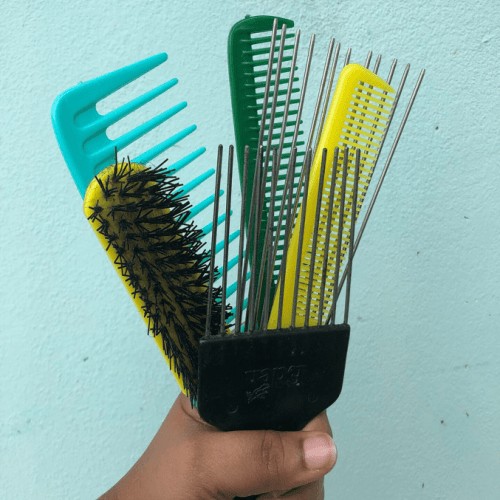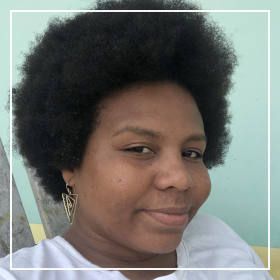Introduction
I met Katie Numi Usher during a conference in London in 2018; she was invited as the winner of that year’s Bridget Jones Travel Award.
K. N. Usher presents two texts that are about the intersections (Particia Hills Collins, 2000)[1] between ideal representations of youth, family members, acceptability, self-love, and visibility in the racial stratification of postcolonial societies. They are two of her stream of consciousness writings; internal monologue that mix, as an oneiric world, the memories of the author. In both her texts the author embodies the energy of breaking metaphorically all combs. She refuses to domesticate proposing a hymn of body positivity and social inclusivity.
Her way of creating artistically resonates with the Fluid Mosaic project as if it functions as the membrane for the cells: it contains in a porous way the poietic activity. She shows through her writing a process of becoming in shape, as it happens with the cells in biology.
Taking inspiration from the biological description of the fluid mosaic, she talks about the process of the transformation of her coiled hairs, and antipodal wishes of self-representation. She talks about her memories and desires of matching her representation with TV actors on Saved by the Bell “where the characters were swinging their hair”. In this teenager series, the actors moved their coiffed hairs in a way that coiled people cannot do so easily. She continues criticizing the expression of ‘relaxing the hairs’, which is used in order to straighten the curls that apparently are visually excessively too ‘agitated’. In order to ‘relax’ the hairs, the hot comb offers a temporal solution to the identity and the wishes of herself as a young girl. Her texts are a message to people who desperately want to look different from the way they do.
She voluntarily states her need and her will against the chameleon act of passing, that is carried through the theme of the Fluid Mosaic. With her poems, she does not want to ‘pass’ as a fiction of identity in a third state of perpetual social camouflage and change. On the contrary, she states boldly her will to embrace her positionality through her personal life, narrative and poetry.
With her works here, she challenges then the liminal state provided metaphorically by the theme of this project, claiming her non-partial but total existence and presence as an afrodescent woman and artist in Belizean society.
Our exchanges reflected on her inner state of change, on how she perceives herself, and the agency contained within self-love as power, following the concept of the Black feminist and poet Audre Lorde (1978-1982)[2].
KATIE NUMI USHER
You Don’t Bring Me Flowers, so I Got Me Some

“The natural hair movement was in large part as a kind of rejection of Euro-centric beauty standards. But what happened often was that there was very much the emergence of like an idealised type of natural hair, which still conforms to Eurocentric norms. I would like there to be more disruption of the hegemonic beauty standard and more appreciation of the hair that was the most stigmatised of the black hair to begin with.”
~ Emma Dabiri, Don’t Touch My Hair[3]
The title of this piece was of course ripped off a 1978 song by Barbara Streisand and Neil Diamond. Clearly this song would not even have been in my consciousness, except for trying to impress my dad, by learning it word for word, chord for chord for a karaoke night duet.
This photo is a gathering of tools, tools I use to try to ‘tame’ my hair so that it won’t rant, rage and rebel too much out in a world which still, even and especially in the natural hair movement is leaning heavily on any and all approximation to Eurocentric beauty standards.
The aspiration, ‘the hair-goal’ is a curl, not a coil. And even if you have coils, you are told to moisturize the hell out of your strands, twist or braid it, let it dry and release, “very slowly to prevent frizz” (those exact words) a looser curl pattern, essentially what a braid-out or twist-out is, a correction of curl pattern. So I am no longer straightening my hair, but I am still pretending at a different hair pattern? This is a gathering of tools, but not in a toolbox, but as one would present a bouquet. Rare the times I have ever received a bouquet or even a kind word for my own hair in its natural state. Only stares, curiosity, the unannounced, uninvited tug of foreign fingers, even the word “tuff” (tough) not in a strong way, but in an undesirable and unyielding way, these are the things my hair receives. Well my hair has broken a comb or two in its day, true, but that is just one detail in a long twisted tale of what is my hair now. But this is exactly what happens when a space was created then quickly repurposed, one is left with one option alone, which is: to create a new space. A space which will celebrate what has been overlooked, and hair-pudding-ed into something else inside a movement which would have once, decades ago, praised your coils.
There is something really powerful in self-gifted bouquets. A celebration and a loving exist in that. So I arranged these combs, tools of ‘handling’ hair like mine, into a bouquet. Later the tugging and pulling can ensue, but for now just a kind bunch of tools to love my hair texture for itself, as it is.
There is so much wrapped up into how Black women are loved, not lusting over us, fantasizing, or better said fetishizing us, but actually loving us, and publicly showing it. Hence the bouquet, and for 4C hair at that.

I remember sat on the ground on a pillow, or on those tiny plastic chairs, between the legs of my aunt, or grandmother, or mom, or a cousin, a neighbour, or a babysitter, the comb parting lines through my poofy-cloud hair, the snagging, the ouch, the cool touch of petroleum (Dax, Blue Magic or one of the others I can’t remember the names of now). I remember a tiny-quick slap of the comb’s bristles on my shoulder because I had nodded off, I always fell asleep. Travelling in and out of sleep, and when I woke up, I would touch the sides of my head, beautiful braids, which felt like manicured shrubs lining houses. I grew up in Belmopan, all the nice rich people had those shrubs lining their yards. I remember the first time I heard it, one of the babysitters, a Latina, said it, that I had one single section of my hair which was “like Spanish! Gyal watch ya, everything tough, except dis wan lee section”. I remember feeling curious, happy and sad, wanted to see it, wondered what made it better than the rest of my hair. I remember when my grandaunt stood for what felt like the whole day with a metal comb, she would place on the stove then pull through my hair. I remember my hair swinging like Lisa Turtle from Save by the Bell after that. I remember her face sunk with horror when she saw me running up trees and chasing my brother and cousins, my face swimming in sweat, my hair puffing at the roots, her three hours of turning cotton to shined silk, gone. I saw this stack on Dax “grease” as we call it in Belize, and the memories came a flood.
[1] Particia Hills Collins. 2000. Black feminist Thought: Knowledge, Consciousness and the Politics of Empowerment, New York: Routledge.
[2] Audre, Lorde. (1978-1982) The master’s tools will never dismantle the master’s house. New York: Penguin Modern.
[3] Emma Dabiri, 2019. Don’t touch my hair, New York: Penguin.
Featured Image by Katie Numi Usher.





